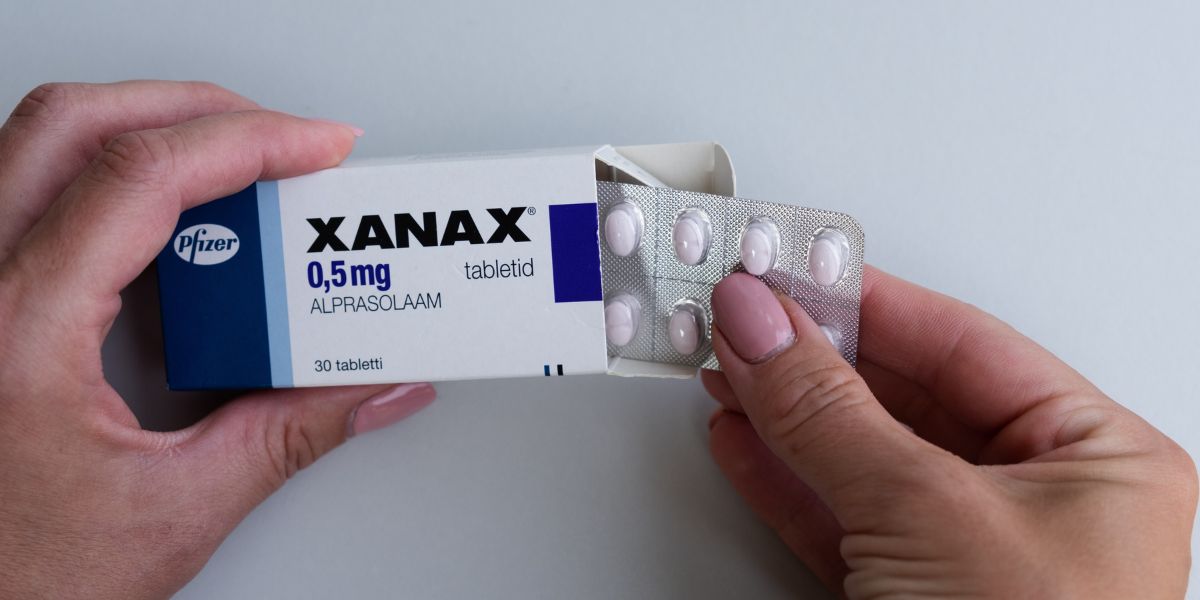Xanax and Sleep: Does It Make You Sleepy?

Xanax (alprazolam) is a commonly prescribed medication primarily used to treat anxiety disorders, including generalized anxiety disorder (GAD) and panic attacks. Belonging to a class of drugs called benzodiazepines, Xanax works by affecting neurotransmitters in the brain to calm overactive mental states.
Xanax is not a sleep medication, but doctors sometimes prescribe it to help with sleep. It can help people who struggle to fall asleep because of anxiety or stress. However, it’s essential to understand the benefits, risks, and long-term effects of using Xanax as a sleep aid.
Xanax is often viewed as a quick fix for anxiety and sleep problems. However, it is important to know that using it for sleep is usually just a temporary solution.
Xanax works by calming the brain, making it easier for people to unwind and sleep. However, the more it is used, the greater the risk of dependency and addiction. This can lead to serious issues like rebound insomnia or addiction.
It’s important to distinguish between treating sleep issues from anxiety and using Xanax for long-term insomnia. Healthcare professionals advise against relying on Xanax for chronic sleep issues because it is primarily an anti-anxiety medication.
What Does Xanax Do?
Xanax or alprazolam is classified as a benzodiazepine, a type of medication that enhances the effects of GABA, a neurotransmitter responsible for inhibiting brain activity and producing a calming effect. This makes it effective in treating anxiety disorders and panic attacks. By slowing down activity in the central nervous system, Xanax induces a sense of relaxation, making it easier for people to fall asleep. However, its sedative effects don’t mean that Xanax is a designated sleep medication.
When doctors prescribe Xanax for short-term use, it is meant to help with sudden anxiety or panic. It is not a long-term fix for sleep problems.
It is important to remember that Xanax can help with anxiety-related insomnia. However, healthcare professionals should closely monitor its use. This helps avoid dependency and other risks.
How Xanax Affects the Brain
Xanax interacts with specific neurotransmitters, particularly GABA, to alter brain function. This interaction helps calm overactivity in the brain, as well as:
- Calms nervous system
- Slows down brain function
- Reduces anxiety and stress
- Increases relaxation

Is Xanax a Sleep Medication?
Despite its sedative properties, Xanax is not considered a sleep medication. While it may help people with sleep issues, such as difficulty falling asleep because of anxiety, it’s not typically prescribed for treating insomnia or other sleep disorders. Instead, medications like non-benzodiazepine hypnotics are more commonly used for sleep
However, some doctors may prescribe Xanax in cases where anxiety is directly contributing to insomnia. The US Food and Drug Administration (FDA) does not approve Xanax solely as a sleep aid. Still, some scientific evidence suggests that in the short term, it can help people fall asleep by reducing the mental and physical tension caused by anxiety.
This off-label use, however, raises concerns because of the risk of habit-forming tendencies and rebound insomnia—a condition where sleep problems worsen after stopping the medication. Other side effects, such as dependence and withdrawal, should be carefully considered before using Xanax for sleep-related purposes.
Why Xanax Isn’t Approved as a Sleep Aid
The FDA does not approve Xanax as a primary sleep medication because of:
- High risk of dependency
- Lack of long-term safety
- FDA restrictions
- Short-term benefits only
The Benefits of Xanax for Sleep
For people struggling with anxiety-induced sleep issues, Xanax can provide temporary relief. Its sedative effects promote muscle relaxation and calm racing thoughts, making it easier for people to fall asleep. If generalized anxiety disorder (GAD) or panic attacks significantly disrupt daily life and sleep, Xanax can help. However, it should only be used under strict medical supervision.
In particular, Xanax may offer benefits for people who experience difficulty staying asleep due to overwhelming anxiety. The drug calms the nervous system. This helps you reach a more restful state. It may also improve REM sleep patterns for a short time.
Xanax helps reduce physical symptoms of anxiety, like a fast heart rate and tense muscles. This can also help with sleep problems caused by anxiety. However, these benefits are usually meant for short-term use. The body can develop a tolerance to the medication over time, which reduces its effectiveness.
When Xanax May Be Prescribed for Sleep
There are specific situations where doctors may prescribe Xanax to help with sleep. These are typically related to anxiety-driven sleep disorders and other conditions, including:
- Severe anxiety or generalized anxiety disorder (GAD)
- Panic attacks at night
- Short-term stress management
- Temporary insomnia relief
The Side Effects of Xanax for Sleep
While Xanax can help with the short-term treatment of sleep problems related to anxiety, its side effects shouldn’t be ignored. Common side effects of Xanax are drowsiness, dizziness, and lightheadedness. These effects may help with sleep but can cause problems if used often.
Over time, people may build a tolerance. This means they need higher doses to feel the same effects. This can raise the risk of dependence.
One of the major concerns associated with Xanax is its potential for habit-forming. Using it for a long time can cause addiction.
Users might feel withdrawal symptoms like irritability, tremors, and rebound insomnia. People who try to stop using Xanax after a long time often find their sleep problems come back. Sometimes, these issues are even worse than before.
Additionally, the side effects of Xanax can extend beyond just sleep disturbances. Using it for a long time can lead to memory problems, confusion, and coordination issues.
These effects can disrupt a person’s quality of life. Additionally, Xanax may interact with other sleep aids or medications, causing complications like excessive sedation or respiratory depression. It is essential to consult with a healthcare professional to weigh these risks against the potential benefits of sleep.

Get Help for Xanax Addiction at Northridge Addiction Treatment Center
If you or a loved one is struggling with Xanax addiction, it’s crucial to get professional help. At Northridge Addiction Treatment Center (NATC), we provide comprehensive, evidence-based addiction treatment programs designed to address benzodiazepine addiction, including Xanax.
Our patient-focused approach includes intensive treatments and therapies like medical detox, dual diagnosis treatment, and cognitive behavioral therapy (CBT).
Whether you’re dealing with rebound insomnia, anxiety, or dependency, NATC is here to help you achieve lasting freedom from addiction. Contact us today.
Find Meaningful Recovery
Our caring and compassionate specialists are eager to help you comfortably navigate this journey to recovery. Our individualized treatment plan, programs, and therapies may be a perfect match for you or your loved one. Let us assist you in living the happy life you deserve. It starts with a phone call.




